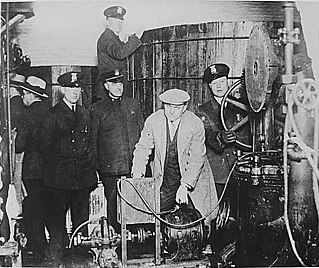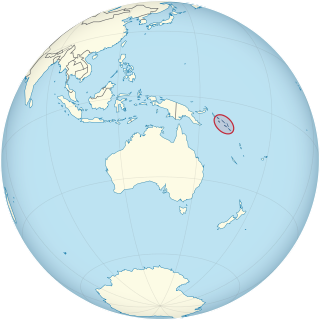
Recreational drug use is the use of one or more psychoactive drugs to induce an altered state of consciousness, either for pleasure or for some other casual purpose or pastime. When a psychoactive drug enters the user's body, it induces an intoxicating effect. Recreational drugs are commonly divided into three categories: depressants, stimulants, and hallucinogens.

The illegal drug trade, drug trafficking, or narcotrafficking is a global black market dedicated to the cultivation, manufacture, distribution and sale of prohibited drugs. Most jurisdictions prohibit trade, except under license, of many types of drugs through the use of drug prohibition laws. The think tank Global Financial Integrity's Transnational Crime and the Developing World report estimates the size of the global illicit drug market between US$426 and US$652 billion in 2014 alone. With a world GDP of US$78 trillion in the same year, the illegal drug trade may be estimated as nearly 1% of total global trade. Consumption of illegal drugs is widespread globally, and it remains very difficult for local authorities to reduce the rates of drug consumption.
Commonly-cited arguments for and against the prohibition of drugs include the following:
Lester Grinspoon was an American psychiatrist and long-standing associate professor of psychiatry at Harvard Medical School best known for his groundbreaking works on the science and social policy of cannabis, psychedelics and other drugs, and for his commitment to changing harmful drug policies. He concurrently served as a senior psychiatrist at the Massachusetts Mental Health Center in Boston, Massachusetts, for 40 years. Grinspoon was a fellow of the American Association for the Advancement of Science and the American Psychiatric Association. He was founding editor of The American Psychiatric Association Annual Review and Harvard Mental Health Letter. Grinspoon was editor of Harvard Mental Health Letter for fifteen years.

Drug liberalization is a drug policy process of decriminalizing, legalizing, or repealing laws that prohibit the production, possession, sale, or use of prohibited drugs. Variations of drug liberalization include drug legalization, drug relegalization, and drug decriminalization. Proponents of drug liberalization may favor a regulatory regime for the production, marketing, and distribution of some or all currently illegal drugs in a manner analogous to that for alcohol, caffeine and tobacco.

Canada's drug regulations are measures of the Food and Drug Act and the Controlled Drugs and Substances Act. In relation to controlled and restricted drug products, the Controlled Drugs and Substances Act establishes eight schedules of drugs and new penalties for the possession, trafficking, exportation and production of controlled substances as defined by the Governor-in-Council. Drug policy of Canada has traditionally favoured punishment for the smallest of offences, but this convention was partially broken in 1996 with the passing of the Controlled Drugs and Substances Act.

Cannabis is a plant used in Australia for recreational, medicinal and industrial purposes. In 2019, 36% of Australians over the age of fourteen years had used cannabis in their lifetime and 11.6% had used cannabis in the last 12 months.

In the United States, the Federal Food, Drug, and Cosmetic Act defined the word "drug" as an "article intended for use in the diagnosis, cure, mitigation, treatment, or prevention of disease in man or other animals" and those "(other than food) intended to affect the structure or any function of the body of man or other animals." Consistent with that definition, the U.S. separately defines narcotic drugs and controlled substances, which may include non-drugs, and explicitly excludes tobacco, caffeine and alcoholic beverages.

The U.S. Federal Government is an opponent of the illegal drug trade; however, state laws vary greatly and in some cases contradict federal laws.

Cannabis is illegal in Nigeria, yet the country is a major source of West African-grown cannabis, and ranked the world's third highest consumer of cannabis.

Cannabis has been cultivated in Japan since the Jōmon period of Japanese prehistory approximately six to ten thousand years ago. As one of the earliest cultivated plants in Japan, cannabis hemp was an important source of plant fiber used to produce clothing, cordage, and items for Shinto rituals, among numerous other uses. Hemp remained ubiquitous for its fabric and as a foodstuff for much of Japanese history, before cotton emerged as the country's primary fiber crop amid industrialization during the Meiji period. Following the conclusion of the Second World War and subsequent occupation of Japan, a prohibition on cannabis possession and production was enacted with the passing of the Cannabis Control Law.
East African drug trade refers to the sale and trafficking of illegal drugs that take place in East African countries like Kenya, Tanzania, Uganda, Somalia, and Ethiopia. The most prevalent types of drugs traded in East Africa are heroin, marijuana, cocaine, methamphetamine, and khat, all of which are strictly prohibited in East African countries.
The illegal drug trade in Japan is the illegal production, transport, sale, and use of prohibited drugs in Japan. The drug trade is influenced by various factors, including history, economic conditions, and cultural norms. While methamphetamine is historically the most widely trafficked illegal drug in post-World War II Japan, marijuana, cocaine, and other prohibited substances are also present. Additionally, Japan's status as a developed economy and the presence of organized crime in Japan have made it a target of the international drug trade.
Cannabis in Liechtenstein is illegal with severe penalties for the production, sale, and possession of marijuana for medicinal or recreational purposes.
Cannabis in Monaco is illegal. The production, sale, and possession of marijuana for medicinal or recreational purposes being a criminal offense with a penalty of up to one year in jail in addition to a fine of up to €1680. Despite the strong laws, the police and courts are often lenient, letting offenders off with a warning.
Cannabis in Djibouti is illegal with penalties for the production, sale, and possession of marijuana for medicinal or recreational purposes. Offenders may be fined or receive up to five years in prison. Use of cannabis in Djibouti is low due to poor conditions for cultivation and the local preference for the legal drug khat.
Cannabis in Tajikistan is illegal with severe penalties for the production, sale, and possession of marijuana for medicinal or recreational purposes. Punishments include up to five years in prison for possession and capital punishment or 25-year sentence for sale.
Cannabis in Haiti is illegal with severe punishments for the production, sale, and possession of marijuana for medicinal or recreational purposes.

Cannabis in the Solomon Islands is illegal for the production, sale, and possession of marijuana for medicinal or recreational purposes. Offenders receive a fine of up to $100,000 or imprisonment of ten years. A 2011 survey of young people, found that 16.1% of males and 11.1% of females had ever used cannabis.

Cannabis in Tuvalu is illegal with severe punishments for the production, sale, and possession of marijuana for medicinal or recreational purposes. Due to the nation's high development index, illegal substance abuse effectively does not exist in Tuvalu and there were no reports of drug-related crimes on Tuvalu in 2019 or 2020.











